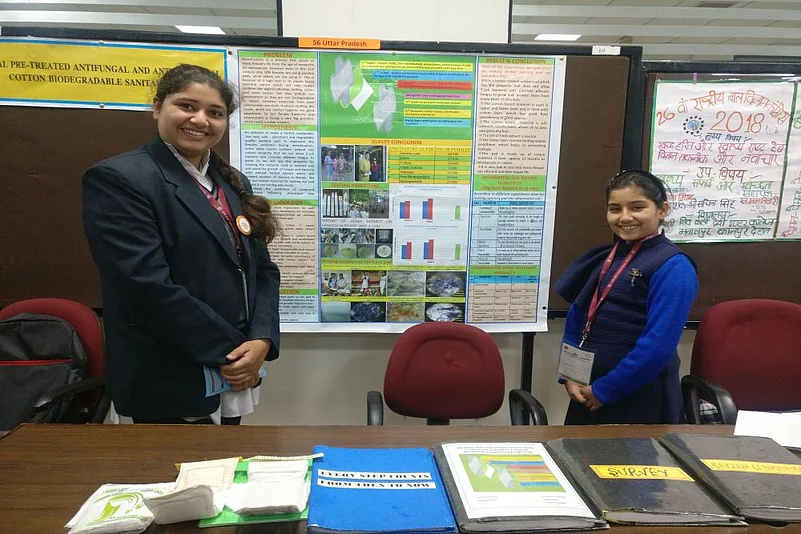12-year-old Saksham Tiwari, son of a farmer, stood unsuspectingly at a corner stall at the Children's Science Congress event, an off-shoot of the Indian Science Congress which aims to promote scientific innovation in children.
Children’s Science Congress or Rashtriya Kishore Vigyan Sammelan, 2019, was held at the Lovely Professional University at Jalandhar, Punjab
Tiwari, from Mangalpur in Kanpur-Dehat, was one of the hundreds of participants at the event, representing his state Uttar Pradesh.
The theme of the 9th class student's project 'Swasth, Safai aur Swachhta' (Health, Hygiene and Cleanliness) explores ideas which can help people in achieving cleanliness goals by inculcating scientific practices in day-to-day chores.
Advertisement

12-year-old Saksham Tiwari with his project
Not intimidated by the suaveness of some of the English-speaking students from private schools around him, Tiwari speaks in chaste Hindi as he explains his project which has experiments on the loss of nutrients in soil due to the use of DAP fertilisers and Urea.
His another experiment is about waste management and classification of wet and dry waste. "If we learn to manage our household waste and classify it properly, it can go a long way in helping us achieve clean surroundings and better health," says Tiwari, with religious conviction.
All around the hall, students from across the country display their projects with subjects ranging from "Study of Larvivorous fish for mosquito control in Avitanallur village, Kerala" to "Implications of natural and anthropological activities on coral reefs in Andaman".
The themes chosen by the students at the Congress reflect concerns and challenges of the states they represent.
Students from Assam presented their project on "Use of coconut shells and betel nut trunk for removal of arsenic on drinking water" and a few stalls away, "To clean unhygienic washroom wall by using motor wiper, wastewater and Neem extract" was the project of students representing Bihar at the Congress.
Recycling, waste management, alternatives for traditional fuels were some of the common themes, reflecting a consciousness among the students of the challenges of life in the twenty-first century and their grit for finding sustainable, scientific solutions is apparent from their work.
One of the most interesting projects at the Congress, related to menstruation, which was also Outlook's issue of the year in 2018, was on herbal sanitary pads.
An argumentative, confident and sharp Krishi Bhat, a tenth-grade student had developed a low-cost, bio-degradable, herbal sanitary pad.
"The pad has herbs," names of which she wouldn't reveal, "with anti-fungal, anti-bacterial properties that can help prevent vaginal infections," said Bhat.
The cost-price of the pad is a mere Rs 2 and her group has already registered a patent for it in 2018.
Bhat is confident that the product can be useful for women who cannot afford the ones available in the market.
She talks about menstrual health with passion and shows a thick file she has prepared with her friends involved in the project, to give an assessment of the effort she and her team have put in for making the product possible.
Haryana's Pancy, a 15-year-old class ten student, with the help of her teacher, Neelam Sharma, has made edible cutlery.
Bowls, spoons, plates made from rice, wheat, sorghum and some salt for taste lay arranged neatly on the table in front.
"The bowl can even hold liquids--for up to 3 hours--," explains Pancy.
"Our products have a shelf-life of 3 months and if we add preservatives, it can be extended up to 6 months," she says in a humble tone.
Advertisement

Pancy (left) with her teacher Neelam Sharma
Sharma, her teacher who has mentored her for the project since August last year, explains the economics of developing edible cutlery.
"The manufacturing cost for spoons would be less than Rs 2 and for big plates would be higher than Rs 2," says Sharma, adding, "it will increase if the project is commercialised, and selling price may reach Rs 10 for big plates, considering all the other costs such"
Much to the frustration of science lovers, a few adults at the Science Congress peddled pseudo-science and attacked established modern scientific concepts while trashing people such as Isaac Newton and Albert Einstein.
In such times, pinning hope on these children to sustain the spirit of scientific innovation may offer some solace to us all.




















